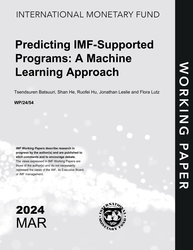
Predicting IMF-Supported Programs: A Machine Learning Approach
Predicting IMF-Supported Programs: A Machine Learning Approach
READ MORE...
Volume/Issue:
Volume 2024
Issue 054
Publication date: March 2024
ISBN: 9798400269363
$20.00
Add to Cart by clicking price of the language and format you'd like to purchase
Available Languages and Formats
| English |
Prices in red indicate formats that are not yet available but are forthcoming.
Topics covered in this book
This title contains information about the following subjects.
Click on a subject if you would like to see other titles with the same subjects.
Exports and Imports , Economics- Macroeconomics , Economics / General , Early warning systems , IMF Lending , Machine Learning , IMF arrangement , ML model , machine learning approach , state-of-the-art machine learning , machine learning model , Emergency assistance , Data processing , Global financial crisis of 2008-2009 , Global
Summary
This study applies state-of-the-art machine learning (ML) techniques to forecast IMF-supported programs, analyzes the ML prediction results relative to traditional econometric approaches, explores non-linear relationships among predictors indicative of IMF-supported programs, and evaluates model robustness with regard to different feature sets and time periods. ML models consistently outperform traditional methods in out-of-sample prediction of new IMF-supported arrangements with key predictors that align well with the literature and show consensus across different algorithms. The analysis underscores the importance of incorporating a variety of external, fiscal, real, and financial features as well as institutional factors like membership in regional financing arrangements. The findings also highlight the varying influence of data processing choices such as feature selection, sampling techniques, and missing data imputation on the performance of different ML models and therefore indicate the usefulness of a flexible, algorithm-tailored approach. Additionally, the results reveal that models that are most effective in near and medium-term predictions may tend to underperform over the long term, thus illustrating the need for regular updates or more stable – albeit potentially near-term suboptimal – models when frequent updates are impractical.



